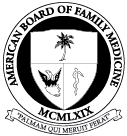American Board Of Family Medicine

The American Board of Family Medicine
1648 McGrathiana Parkway, Suite 550
Lexington, KY 40511-1247
Toll-free: (877) 223-7437
Fax: (859) 335-7516
http://www.theabfm.orgLifelong Learning Requirements
- Complete 150 CME credits of specialty-relevant CME every three years. A minimum of 75 of the 150 CME Credits must be AMA PRA Category 1 Credits™.
- Complete a minimum of one Self-Assessment Activity every three years. This requirement can be met from the successful completion of a Knowledge Self-Assessment (KSA) activity or by completing at least 4 quarters of the Continuous Knowledge Self-Assessment (CKSA) in each 3-year period. Successful completion of a KSA earns 10 ABFM points and 8 AMA PRA Category CME Credits™ and the CKSA is worth 2.5 ABFM points per quarter. Both activities can be accessed through the ABFM Physician Portfolio.
- The Clinical Self-Assessment (CSA) is now optional. Successful completion of a CSA earns 5 ABFM MOC Points and 4 AMA PRA Category 1 Credits™. CSA’s are accessed through the ABFM Physician Portfolio.
The requirements and other information provided on this page are determined by each ABMS Member Board and may be subject to change. Please refer to the relevant Board’s website to confirm the applicable requirements.
Specialties & Subspecialties
Health Care Administration Leadership and Management

